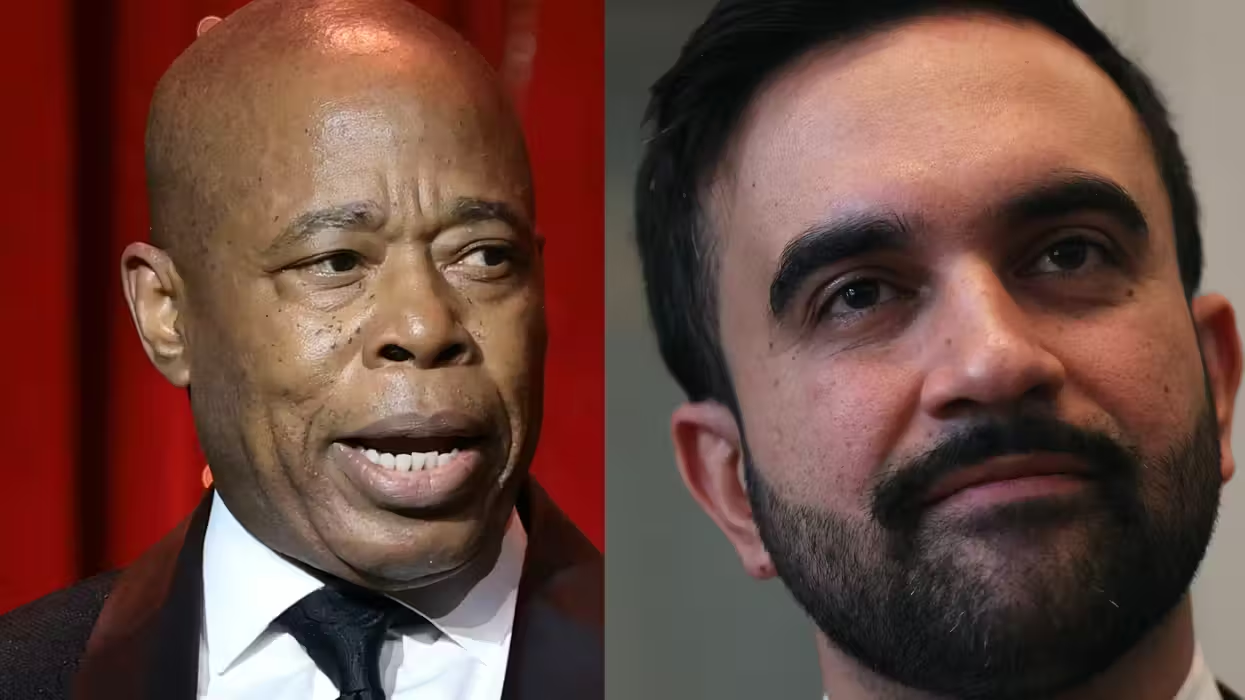
© 2026 Blaze Media LLC. All rights reserved.
Can a Maryland judge force Trump and Texas to resettle more refugees? NO
January 16, 2020
The Founders created a system in which all three branches of government would have to independently defend the Constitution. They gave the judicial branch the fewest tools to impose its will on issues affecting the population at large. Never in their wildest dreams did they envision the other branches genuflecting to the Supreme Court, much less lower court judges, but that is what will continue happening until they simply say, “No.”
Yesterday, a single Maryland judge gave private taxpayer-funded “nonprofit” organizations standing in court to get an injunction against the president’s policy allowing states like Texas to reject their resettlement plans. “Refugee resettlement activity should go forward as it developed for the almost 40 years before Executive Order 13888 was announced,” declared Judge Peter J. Messitte of the Maryland District Court, a Clinton appointee.
Here’s the problem. The Constitution never gave a judge a veto power, like the president has the ability to veto a piece of legislation sent to his desk. A judge can only grant relief to a plaintiff that properly has standing before the court, such as a citizen claiming an executive force is wrongly detaining or punishing him. No such standing exists, however, in this case, because the “plaintiffs” are a bunch of private organizations seeking positive actions and benefits from government affecting all of America on a national and even international political question, not “relief” from an action taken against them personally.
No judge can force the president to bring in foreign nationals he chooses not to admit, nor can a judge grant visas to potential foreign nationals. And a Maryland judge most certainly can’t force Texas Gov. Greg Abbott to agree to refugee resettlement just because a taxpayer-funded group desires it.
Naturally, the question I get asked is “What now?” How can Trump push back against the ruling? But the question is silly and is only asked because of the lack of education about our most basic rules of governance. The bigger question is how a single judge can push back against the other branches and what power he has to effect his ruling? Can a judge order the president to sit down and have brunch with me every Sunday, and is there nothing the president could do to stop it? Can a judge order the president to pursue specific strategic maneuvers with the military or forge specific policies with foreign leaders?
In reality, not only are there many constraints on judicial power, but our Founders didn’t even believe they needed constraints, because even when judges are not abusing power and when they are properly interpreting the law, they have no power of enforcement. While observing that the Supreme Court would be the “least dangerous” branch of government, Alexander Hamilton wrote in Federalist #78 that the court has “neither force nor will, but merely judgment, and must ultimately depend upon the aid of the executive arm for the efficacy of its judgments.”
Notice Hamilton doesn’t talk about presidents or governors “defying” courts. He does one better. From the get-go, court orders have no force and require “aid” from the executive branch just to get on the map, especially affirmative policies, such as border security, issuance of visas, and printing of census questions. As Eleventh Circuit Judge William Pryor once said, “Hamilton’s point was that we must depend upon the persuasiveness of our written opinions to command the respect of our fellow citizens. In that way, we have the foremost responsibility of safeguarding our independence.”
In Federalist #81, Hamilton dismisses concerns from anti-federalists that somehow because the courts interact with the people under the law at the end of the policymaking process, they will laugh last and laugh best, having the final say on the implementation of a law or a policy. He called the concern, which today has become a reality, “a phantom.” Why could he easily dismiss the concern of judicial usurpations? Because of the Supreme Court’s “comparative weakness” compared to the other branches in “its total incapacity to support its usurpations by force.”
The Constitution simply never gave the courts a veto power such as it gave to the president. An injunction is merely a form of relief granted in an individualized case or controversy. But if a judge is going to use that case to somehow illegally adjudicate a policy issue with no standing and issue a broad policy directive, even if he is correct on the merits, it has as much effect as a declaration from me or you or any private citizen absent the affirmative “aid” of the executive branch.
Implicit in Hamilton’s design is obviously the premise that the presidents and governors have the power to not grant aid to court rulings and, under the right circumstances, will use that power. Denying the judiciary the power of enforcement is not a bug in the system; it is a feature.
For example, throughout Trump’s presidency, there have been numerous times when judges have given standing to litigate an immigration policy where statute explicitly strips the courts of jurisdiction to hear the case. Just yesterday, the ACLU sued the administration’s third-party asylum agreement with the Guatemalan government that allows asylum-seekers from Honduras and Guatemala to be sent there. The law says, in black and white (8 U.S.C. § 1158(a)(3)), “No court shall have jurisdiction to review any [asylum exemptions] determination of the [DHS secretary] under paragraph (2),” including Safe Third Country agreements. Thus, the courts have no power to adjudicate this case and certainly no power to enforce a usurpation.
The Trump administration has an obligation to uphold the law and not give force to any judicial usurpation the same way everyone agrees a judge has an obligation to uphold the law or Constitution and not give force to an executive action wrongly imprisoning a citizen. If anything, the executive branch is the one with the power to implement its legal interpretation, much more than a court.
Therefore, when Texas Governor Greg Abbott is faced with a ruling from an illegally adjudicated case in another state as against the president’s interpretation of law, he also has a requirement to follow the one he knows to be correct. To say that any court at any time on any issue has the final word would violate the basic principle of government laid out by James Madison in Federalist 49: “The several departments being perfectly co-ordinate by the terms of their common commission, neither of them, it is evident, can pretend to an exclusive or superior right of settling the boundaries between their respective powers.”
Imagine that Madison and Hamilton were alive today and were asked, “Which branch is more powerful – Congress or the Supreme Court?” They would laugh at the absurd premise of the question. Imagine that they were asked, “Which is more powerful – Congress or a district court?” They wouldn’t even understand the question.
Then consider the absurdity of how far the malignant practice of judicial supremacy has been allowed to grow. Presidents of both parties have consistently rebuffed congressional subpoenas and other orders from standing committees. This just recently happened during the impeachment hearings. Everyone understands the principle of separation of powers in this context, and nobody asks, “How can the president defy Congress?” But somehow when a district judge seeks to rule on an abstract national question, it is instantaneously and unquestionably binding over all the states and other branches of government – no matter the authenticity of the legal rationale or whether courts exercised a valid use of the judicial power at all.
Instead, it’s time we start asking how judges can defy the other branches of government and plainly written law. The answer is they can’t.
Want to leave a tip?
We answer to you. Help keep our content free of advertisers and big tech censorship by leaving a tip today.
Want to join the conversation?
Already a subscriber?
Blaze Podcast Host
Daniel Horowitz is the host of “Conservative Review with Daniel Horowitz” and a senior editor for Blaze News.
RMConservative
Daniel Horowitz
Blaze Podcast Host
Daniel Horowitz is the host of “Conservative Review with Daniel Horowitz” and a senior editor for Blaze News.
@RMConservative →more stories
Sign up for the Blaze newsletter
By signing up, you agree to our Privacy Policy and Terms of Use, and agree to receive content that may sometimes include advertisements. You may opt out at any time.
Related Content
© 2026 Blaze Media LLC. All rights reserved.
Get the stories that matter most delivered directly to your inbox.
By signing up, you agree to our Privacy Policy and Terms of Use, and agree to receive content that may sometimes include advertisements. You may opt out at any time.






